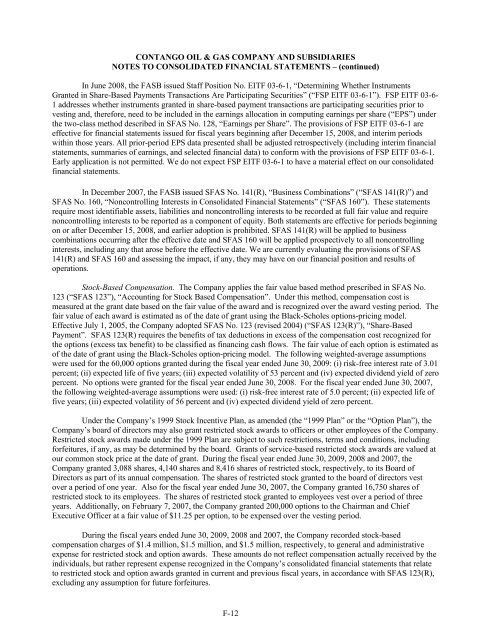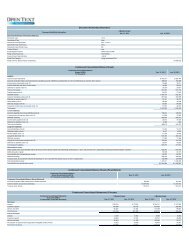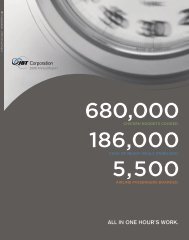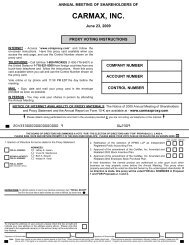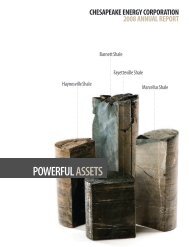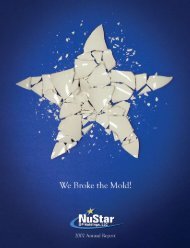FORM 10-K CONTANGO OIL & GAS COMPANY
FORM 10-K CONTANGO OIL & GAS COMPANY
FORM 10-K CONTANGO OIL & GAS COMPANY
Create successful ePaper yourself
Turn your PDF publications into a flip-book with our unique Google optimized e-Paper software.
<strong>CONTANGO</strong> <strong>OIL</strong> & <strong>GAS</strong> <strong>COMPANY</strong> AND SUBSIDIARIES<br />
NOTES TO CONSOLIDATED FINANCIAL STATEMENTS – (continued)<br />
In June 2008, the FASB issued Staff Position No. EITF 03-6-1, “Determining Whether Instruments<br />
Granted in Share-Based Payments Transactions Are Participating Securities” (“FSP EITF 03-6-1”). FSP EITF 03-6-<br />
1 addresses whether instruments granted in share-based payment transactions are participating securities prior to<br />
vesting and, therefore, need to be included in the earnings allocation in computing earnings per share (“EPS”) under<br />
the two-class method described in SFAS No. 128, “Earnings per Share”. The provisions of FSP EITF 03-6-1 are<br />
effective for financial statements issued for fiscal years beginning after December 15, 2008, and interim periods<br />
within those years. All prior-period EPS data presented shall be adjusted retrospectively (including interim financial<br />
statements, summaries of earnings, and selected financial data) to conform with the provisions of FSP EITF 03-6-1.<br />
Early application is not permitted. We do not expect FSP EITF 03-6-1 to have a material effect on our consolidated<br />
financial statements.<br />
In December 2007, the FASB issued SFAS No. 141(R), “Business Combinations” (“SFAS 141(R)”) and<br />
SFAS No. 160, “Noncontrolling Interests in Consolidated Financial Statements” (“SFAS 160”). These statements<br />
require most identifiable assets, liabilities and noncontrolling interests to be recorded at full fair value and require<br />
noncontrolling interests to be reported as a component of equity. Both statements are effective for periods beginning<br />
on or after December 15, 2008, and earlier adoption is prohibited. SFAS 141(R) will be applied to business<br />
combinations occurring after the effective date and SFAS 160 will be applied prospectively to all noncontrolling<br />
interests, including any that arose before the effective date. We are currently evaluating the provisions of SFAS<br />
141(R) and SFAS 160 and assessing the impact, if any, they may have on our financial position and results of<br />
operations.<br />
Stock-Based Compensation. The Company applies the fair value based method prescribed in SFAS No.<br />
123 (“SFAS 123”), “Accounting for Stock Based Compensation”. Under this method, compensation cost is<br />
measured at the grant date based on the fair value of the award and is recognized over the award vesting period. The<br />
fair value of each award is estimated as of the date of grant using the Black-Scholes options-pricing model.<br />
Effective July 1, 2005, the Company adopted SFAS No. 123 (revised 2004) (“SFAS 123(R)”), “Share-Based<br />
Payment”. SFAS 123(R) requires the benefits of tax deductions in excess of the compensation cost recognized for<br />
the options (excess tax benefit) to be classified as financing cash flows. The fair value of each option is estimated as<br />
of the date of grant using the Black-Scholes option-pricing model. The following weighted-average assumptions<br />
were used for the 60,000 options granted during the fiscal year ended June 30, 2009: (i) risk-free interest rate of 3.01<br />
percent; (ii) expected life of five years; (iii) expected volatility of 53 percent and (iv) expected dividend yield of zero<br />
percent. No options were granted for the fiscal year ended June 30, 2008. For the fiscal year ended June 30, 2007,<br />
the following weighted-average assumptions were used: (i) risk-free interest rate of 5.0 percent; (ii) expected life of<br />
five years; (iii) expected volatility of 56 percent and (iv) expected dividend yield of zero percent.<br />
Under the Company’s 1999 Stock Incentive Plan, as amended (the “1999 Plan” or the “Option Plan”), the<br />
Company’s board of directors may also grant restricted stock awards to officers or other employees of the Company.<br />
Restricted stock awards made under the 1999 Plan are subject to such restrictions, terms and conditions, including<br />
forfeitures, if any, as may be determined by the board. Grants of service-based restricted stock awards are valued at<br />
our common stock price at the date of grant. During the fiscal year ended June 30, 2009, 2008 and 2007, the<br />
Company granted 3,088 shares, 4,140 shares and 8,416 shares of restricted stock, respectively, to its Board of<br />
Directors as part of its annual compensation. The shares of restricted stock granted to the board of directors vest<br />
over a period of one year. Also for the fiscal year ended June 30, 2007, the Company granted 16,750 shares of<br />
restricted stock to its employees. The shares of restricted stock granted to employees vest over a period of three<br />
years. Additionally, on February 7, 2007, the Company granted 200,000 options to the Chairman and Chief<br />
Executive Officer at a fair value of $11.25 per option, to be expensed over the vesting period.<br />
During the fiscal years ended June 30, 2009, 2008 and 2007, the Company recorded stock-based<br />
compensation charges of $1.4 million, $1.5 million, and $1.5 million, respectively, to general and administrative<br />
expense for restricted stock and option awards. These amounts do not reflect compensation actually received by the<br />
individuals, but rather represent expense recognized in the Company’s consolidated financial statements that relate<br />
to restricted stock and option awards granted in current and previous fiscal years, in accordance with SFAS 123(R),<br />
excluding any assumption for future forfeitures.<br />
DB2/2<strong>10</strong>43537.7 F-12


